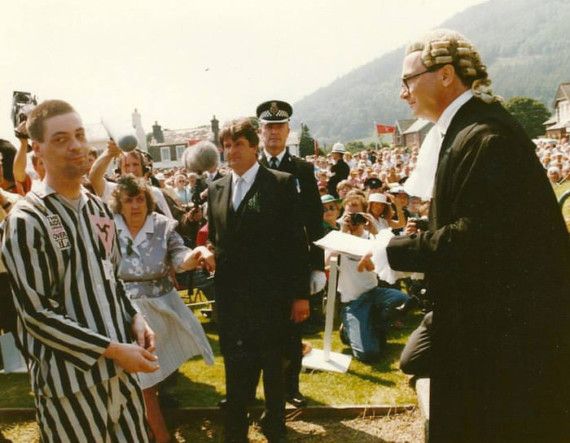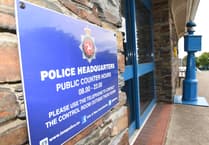The island’s most well-known gay rights campaigner has questioned how pardons for historical homosexuality-related offences are being carried out.
Alan Shea was speaking after full pardons were granted to all people convicted of historical homosexual offences in the Isle of Man.
Anyone who has been cautioned or convicted of a historic sexual offence has now been automatically pardoned – if the act would no longer be considered a crime in modern law.
The measure will also apply to anyone who has died since their conviction.
It is difficult to know how many men this will potentially impact due to the historic nature of the convictions and cautions, but it is believed to be around 30.
The ability to grant pardons in this way was incorporated into the Sexual Offences and Obscene Publications Act 2021 and has been applied by the Department of Home Affairs.
The government had previously committed to turning on Part 11 of the Act (which grants pardons) by the end of June.
This has now been enacted.
In addition to the pardons, people are now able to apply to the Department of Home Affairs to have any historical conviction removed from their record.
This formal ‘disregard’ process means that any conviction, caution, warning or reprimand would be considered as having never happened, and would not appear on a criminal record or in any criminal record checks.
This process is expected to take no longer than 12 weeks from application, and guidance has been produced to help applicants through the process.
Automatic pardons and disregards will not apply to any convictions where the offence would still be considered a crime, such as non-consensual sex and having sex with someone aged under 16.
Minister for Justice and Home Affairs Jane Poole-Wilson MHK said: ‘I hope that these automatic pardons will help to address at least some of the hurt caused by our historical laws.
‘It is very difficult to accept how it was once common place for people to be criminalised in this way.’
She added: ‘Our society has progressed and become much more inclusive and tolerant than when these discriminatory laws were in place, but we still have work to do to protect everyone in our community.’
The pardons are a culmination of cross-department work, as Mrs Poole-Wilson explained: ‘[There] had to be a lot of behind the scenes work to work up that [disregard] application process.
‘We’ve also had some really positive engagement with the Isle of Man Constabulary Scrutiny Group and Isle of Pride to look at the applications guidance and so on and get their feedback, so that was really valuable as well.’
Alan Shea was pleased to see the pardons announced, but questioned the manner in which they are being rolled out.
Mr Shea dressed in the striped uniform of a Nazi concentration camp victim at the foot of Tynwald Hill 30 years ago, in a protest that grabbed the attention of the entire island as he highlighted the plight of gay people suffering under the anti-homosexuality laws still in place at the time.
As a result of his Petition for Redress of Grievance to decriminalise homosexuality, and the attention his protest drew to the issue, private and consensual acts of male homosexuality on the island were decriminalised in 1992 – 25 years later than in England and Wales, and 12 years after Scotland.
Reacting to the news of the pardons, Mr Shea said: ‘My view is, I know they are saying it’s automatic, but you’ve still got to apply for it [to be wiped from your record].
‘Well why can’t they just send out a letter that says it’s all been wiped clean?
‘Why put people through all this torment about going back into the past again?
‘They don’t even know how many there are, so have they lost records? If they don’t know the figures, where has the information gone? It’s not looking good when they lose your information. People are going to be applying for this, and if they don’t have the information from 30 years ago, why bother.’
He added: ‘My other point is, is that you’ve got to remember, people died.
‘People died 30 years ago, so where is the apology?’
When asked whether the police would officially apologise, Mrs Poole-Wilson said: ‘What I’m really pleased about is that the chief constable has also been talking to the Scrutiny Group and Isle of Pride around the historic policing, and that engagement is ongoing, so I’m really looking forward to hearing where they get to.
‘I think it’s been a really good opportunity I believe, from the Chief Constable’s perspective, to hear from representative groups about some of the hurt and experience that people feel still from that historic policing.
‘So that engagement has been happening, it’s still ongoing, and I’m looking forward to hearing the output of that in due course.’
The news of historic pardons came in the same week that the Manx Museum opened its temporary ‘Cabinet of Queeriosity’ exhibition.
It celebrates the history of the Isle of Man’s queer community and how it is reflected in places, objects, landscapes and culture.
The cabinet was co-curated by Manx National Heritage and Kensington Arts, and is supported by Isle of Pride.
One of the key items in the exhibit is Mr Shea’s historic Tynwald Day protest outfit.

.jpeg?width=209&height=140&crop=209:145,smart&quality=75)


